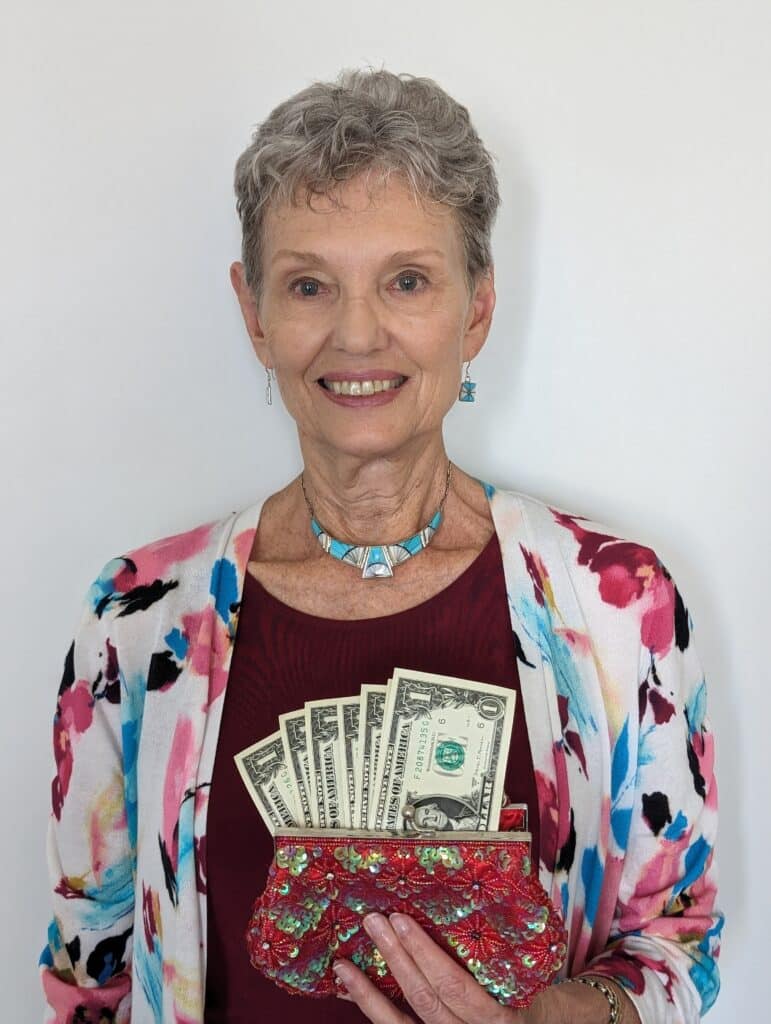
My Husband Told Me to Find Another Partner… and to Watch Out for My Money!
“Find someone to travel through life with after I’m gone.” That was my husband’s advice before he died 17 years ago. “You have so much love to give. Don’t stay alone forever.” Then he added a most important recommendation, “Just be careful the new guy isn’t after your money!”
After Tom’s death, I wasn’t interested in remarriage. At age 60, I had a good life. That included a fulfilling profession as a certified financial planner, a loving extended family, strong friendships with women, and ties to my spiritual community.
I Tried Online Dating to Meet More People
But after working my way through initial heavy grief, I decided to try online dating as an interesting way to meet more people. My goal was not marriage. Instead, I focused on finding someone to go bicycling with, enjoy a musical concert, talk about a movie we saw, eat dinner in a quaint bistro, see a special art museum exhibit, walk on the beach, or take my rowboat out for a leisurely sunset cruise around the lake behind my house.
I was a complete dating rookie back then. The last time I went on a date was decades ago. Online dating didn’t exist in those dinosaur days. The new apps I tried expanded the potential of meeting more fellows. However, most men I met online didn’t stay on my radar screen for long.
General Misrepresentations
Some examples include (all names are fictional):
- Despite my best efforts to avoid smokers, Harry’s cigarette breath joined us during our initial face-to-face encounter.
- Next was Frank, whose online photo was 10 years younger than the year on his driver’s license.
- Pete’s profile indicated he didn’t drink alcohol, but he downed three brandy Manhattans before dinner!
- On our second date, Tony bragged about a crime he committed years ago without being caught.
- With tears in his eyes, George claimed to be a widower. Wrong. He was still very much married. I hightailed it!
Lying About Financial Matters
Many fellows also misrepresented their money matters. For example:
- Doug said he owned his home. Nope! Just a lone tenant.
- Mike maintained that he worked for a major financial firm. Not true.
- When Bill suggested I pick up the check, “since you’re a rich financial planner,” I did that and also erased his phone number and email address.
- Ralph asked me for a “small loan” to help with medical bills from a prior accident.
- Walter had a legal claim placed on his property.
- Shopping and high credit card balances were Ted’s addictions.

Using online research tools, I uncovered truths about several of those men who considered me to be a purse.
Bye-bye to all these dubious daters, several of whom proposed marriage shortly after we met. No thanks. I’m not interested.
Indeed, after a couple of years of false starts and rough stops, trying a half-dozen dating apps, I decided not to renew them. It was a waste of time. But right before canceling that last dating app, one final possible match came through. “What the heck,” I thought. I logged in and clicked the response key. That link led to my new husband, Charlie, whom I wed seven years down the road. That last one was the best one, indeed.
Mature Women’s Advice
In a study published by the Journal of Financial Service Professionals, mature women who had experienced widowhood and later remarried or re-partnered long-term advised other widows about money and legal issues they had experienced.
Many concurred that financial disagreements derailed past love affairs. Most agreed that it’s essential to talk about money matters before committing to being a couple so as not to be blindsided in the future. That was the case with one woman who said, “I didn’t bring up the money stuff because I thought it would hurt our relationship before we married. Boy, was I wrong.” Another woman shared, “He pursued me for three years before I finally said ‘yes’. Then he cleaned me out financially in three months.”
10 Money Questions
My partner, Charlie, and I discussed answers to 10 money questions more than a dozen years ago as we began our long-term relationship as a committed couple. We reaffirmed our actions several years later when we exchanged marriage vows. That’s when we revisited our money talks to reaffirm our plans for moving forward together. Below are those questions in boldface type, with our responses in italics:
1. How will we make decisions about money, such as spending, saving, handling debt, and budgeting?
We communicate well about everything, including money matters. It’s known that money is the biggest area couples fight about – more than sex, children, and the division of household tasks. Charlie and I avoid squabbling by talking about finances frequently.
2. Who pays for what? Will we use a joint credit card or checking account for shared expenses?
Charlie and I applied for a new joint credit card for purchases we use and enjoy together. That includes home-related expenses, car repairs and gasoline, entertainment, groceries, and more. Likewise, we added a joint checking account. At the same time, we each maintained our separate checking accounts and individual credit cards.
The joint credit card monthly bill is paid in full automatically from our joint checking account. We each made deposits into that joint checking account from our personal money. We agreed that it’s fair for Charlie to add more to our joint checking account than I contribute because he receives more income than I do. For example, when we put $5,000 into our checking account, $3,000 is from Charlie and $2,000 is from me.
Note that we each pay for personal items such as clothing, gifts, self-care, and other individual expenses, from our separate accounts.
3. Will we live together full-time or keep separate homes?
Since Charlie and I enjoy each other’s company, we travel together to and from our main home and vacation house, spending about six months at each location.
4. If we live together full-time, whose place will we choose? Or should we move into a different home?
We bought a Florida condo together when I sold the house I owned before with my late husband. Charlie has owned his New York home for the past four decades. We rebuilt that house nearly a decade ago, so it’s like a new residence.
5. What are our plans for retirement? If already retired, what retirement lifestyle does each of us desire?
Charlie retired at age 61 before we met. Conversely, I ran a successful financial planning business and wasn’t ready to retire then. Charlie continued to enjoy his various hobbies and activities while I worked with my clients. Now partly retired, I’m teaching as Adjunct Faculty at The American College of Financial Services, plus writing and speaking. It’s a comfortable balance of together and other independent activities that works well for us.
6. Will we merge our investments or hold them separately?
We’ve always kept our investments separate except for the checking account and credit card we hold jointly.
7. How will we handle it if one of us earns substantially less than the other or has fewer financial assets?
Adding the total value of what I own and comparing this with Charlie’s total value of what he owns, our numbers are quite similar. We are both financially independent, which is a great foundation for our relationship. I’m not dependent on my husband, and vice versa. Charlie’s income is more than mine, and we’ve equitably adjusted for that, as I mentioned previously.
8. What about health issues and potential costs down the road? How will we navigate those?
Both Charlie and I are in excellent health – body, mind, and spirit. Indeed, I expect us to live into our 90s or beyond. I own long-term care insurance, purchased more than 20 years ago. We both have great supplemental health insurance in addition to Medicare. We intend to relocate to a life plan retirement community in our early 80s, which offers comprehensive continuing care services in the event that we require these levels of assistance in the future.
9. What financial responsibilities are we willing to take on for our children or aging parents?
Our parents are long gone. We’ve both helped our adult children over the years when they’ve needed a bit of a boost. Indeed, we like giving them “warm hand monetary gifts” while we are alive, rather than passing everything to them as an inheritance when we’re dead.
10. How do each of us feel about a prenuptial agreement?
As a financial advisor, I often suggested that widowed clients think about getting a prenuptial agreement, especially before remarrying soon. However, Charlie and I opted not to establish a prenuptial agreement after consulting with our elder law attorney, taking into consideration our several trusts that were already in place and the titling of our assets.
Starting Your Money Conversations
Being open and honest with your partner about money matters can strengthen your bond as a couple. Before you bring up these 10 topics, be aware of how your partner handles money. Start by saying something like, “Recently, I’ve been considering our financial future. As we think about that time together ahead, I’d like us to talk about this.
Instead of posing all 10 questions at once, choose a moment when you’re at ease. Maybe sitting in a quiet place with your favorite beverage after Sunday supper. Try to speak calmly, and don’t go on for more than 30 minutes during your first money talk. Then try another money question the next week.
You and your partner will discover what is and isn’t negotiable. If cooperation isn’t possible in some circumstances, what about trying a different strategy that you both find comfortable? There is no one-size-fits-all ideal approach to managing a couple’s finances. If you hit a serious roadblock, that red flag tells you something. You may want to consider talking with a professional financial therapist.
Further read, WIDOWS ROCK! THRIVING IN STAGE 3 OF WIDOWHOOD.
Let’s Have a Conversation:
What have been your money stories as a single woman moving toward a committed relationship that may include marriage? If you’ve already done this, how did you and your new partner handle these or other money questions?







Thank you for this article. As a 63 year old widow returning to the possibility of dating, I am hesitant with on-line dating and its related concerns. Very glad to read about your happy dating app result. This might give me the shove I need to use an on-line dating app. Thank you for these questions to start the conversations.
Only after many failed and half-started results did online dating finally work for me. Glad to know you’ll try those money questions.
Money is tricky. I personally would keep money separate. Causes fewer problems.
Good that you’ve defined what works for you.
This was a very interesting and informative article. My second husband died seven months ago, and I am now a 70 years old widow. I am also fortunate in that I am not rich, but I am definitely comfortable. I own my home mortgage free and have no debt. Between my Social Security and small withdrawals from investments, I should be fine. I really have no desire to ever marry again, but I might want to venture into just male companionship in the future. This gave me something to think about!
I wish you well on your journey going forward.
Excellent advise in this story. I would say these questions can be used in any relationship (not retired, semi-retired, widowed, divorced) prior to it getting started with someone else. Thank you.
Yes, these 10 money questions can be appropriate in many situations involving a life transition. They were specifically gathered based on our research with mature widows who gave advice based on their experiences in partnering and/or remarrying.
Terrific advice and financial discussion questions. The dating apps are a chore but they worked in the end for you. Interestingly, I found my long term domestic partner after being on the apps for 3 months, and dropping the financial requirement filter. Hi was also a widow and financially solid but did not want to include his salary on the apps to avoid meeting “golddiggers.”
I like that you have a joint credit card for spending that you do together, repayed from the joint checking account. Curious how you made the decision to remarry Charlie versus living in a long term committed relationship? Good luck to both of you!
Thank you. Charlie and I were in a committed relationship for seven years before we married. Initially, I had no intention of marrying again. That was partly for professional reasons. However, a wonderful mentor observed that I might be holding myself back by not marrying Charlie. “You can go full circle and still be a great example for other widows,” he told me. Our adult children were thrilled that we finally decided to get married. My dear husband had been patiently waiting until I was ready. “We make a great little bonded team,” he told me after the wedding. It was the right decision at the right time for us. This year, we’ll celebrate our sixth anniversary. :-)